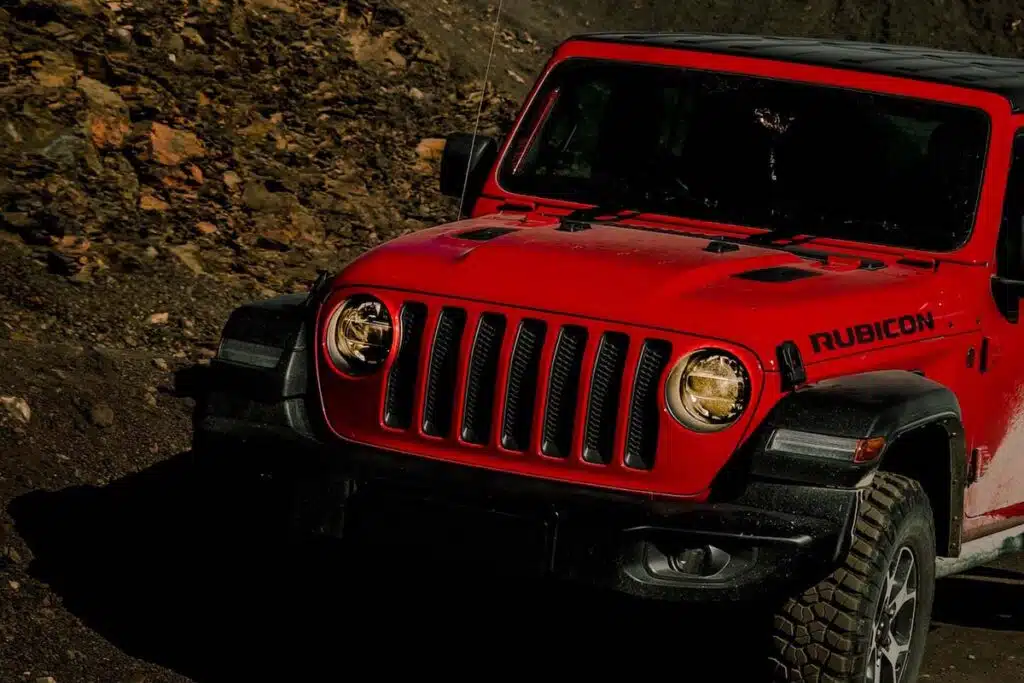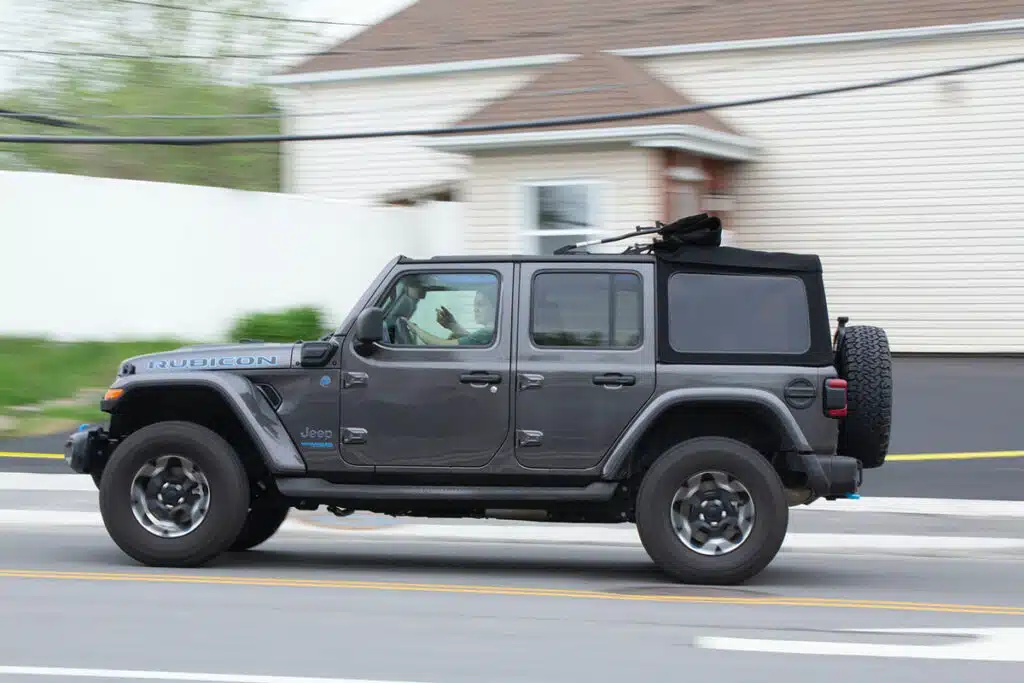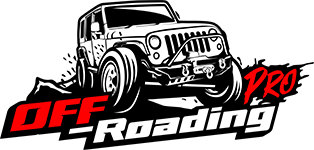Hearing unfamiliar sounds emanating from your wheels can be quite unsettling. After all, it only takes one significant issue to render your Jeep Wrangler unsafe and inoperable. But while arranging a prompt inspection is the best course of action, it wouldn’t hurt to be familiar with what triggers the popping noise.
Reasons behind the Jeep Wrangler’s popping noise while driving include issues with the tire-and-wheel assembly, drivetrain system, or suspension and steering components. Mishaps like low transmission fluid to installing an incompatible aftermarket lift kit can also cause the unusual sound.
Here are some of the things that may be causing your Jeep Wrangler to make a popping noise:
- Damaged CV Joints
- Compromised Suspension Components
- Loose Hub Caps
- Overinflated or Misshapen Tires
- Faulty Steering System Components
- Cracked or Leaking Exhaust System
- Misfiring Engine
- Problematic Drivetrain Assembly
- Transmission Issues
- Worn Wheel Bearings
- Loose Bolts or Fasteners
- Residual Particles from Worn LSD
- Deteriorated or Loose Parts
- Installation of Aftermarket Lift Kits
There is no single source or scenario linked to these popping noises. Not only do they trace back to multiple vehicle systems and components, but they also occur following cold starts, while opening the door, or when speeding up or cornering.
As this atypical sound results in a great deal of worry, this article will go over this predicament’s underlying causes — in an attempt to help Jeep Wrangler owners like you prevent them.
Causes of Jeep Wrangler Popping Noises

There are several reasons why your Jeep Wrangler would make sudden popping or clicking noises. Below is a non-exhaustive list of the possible culprits behind this unusual sound:
1. Damaged CV Joints
Perhaps the most prevalent cause of a clicking or popping sound is a broken CV joint (essentially the wrists of your Jeep’s steering system).
These joints are positioned at the extremity of the front axle and facilitate the flexibility required by the latter when the wheels and suspension move. However, when this joint becomes damaged or fractured, the axle loses its flexibility, resulting in a persistent popping noise when the wheels are turned.
2. Compromised Suspension Components
Faulty suspension components like struts, control arm bushings, sway bar links, and ball joints arguably come in second as the top culprit behind Jeep Wrangler popping noises —and rightfully so. When these parts deteriorate, they are likely to produce sounds when the rig is in motion or when the suspension is compressed or extended.
Struts
Struts (view on Amazon) should be an unsurprising part of this list, as they are integral to the rig’s suspension system and provide structural support and dampening capabilities. When they fail, struts tend to move or bind, resulting in popping noises while driving.
Shock Absorbers
Like struts, shock absorbers are crucial components that dampen vibrations and control suspension movement. They may produce unusual noises when they deteriorate or experience internal damage.
But this likelihood increases when the shock’s valving system fails. The reason is that any defect in the valving system automatically leads to irregular movement, causing the affected shocks to make popping or clunking sounds.
Sway Bar Links
When it comes to sway bar links or bushings being the culprit, the scenario is quite specific. You may experience popping noises when accelerating. This is because the sway/stabilizer bar minimizes body roll when the vehicle is in motion (not only during cornering).
It’s also constantly subjected to increased torque and load during acceleration. If it’s not in good condition, these elements become stressors for the stabilizer bar and exacerbate any existing flaws that it may already have.
Ball Joints
Ball joints generate popping noises when turning. This outcome makes perfect sense since ball joints connect the steering knuckles and control arms.
Functionally, they allow for controlled movement and flexibility during a vehicle’s steering and suspension articulation. But when worn or damaged, they develop excessive play resulting in popping sounds. These noises are particularly noticeable during turns or when traversing uneven terrain.
3. Loose Hub Caps
While they appear decorative, hub caps serve functional purposes for your Jeep, protecting its wheel hubs (view on Amazon) from dirt, moisture, and debris. And when these caps become loose or are improperly installed, they can create popping noises.
Note, however, that these unusual sounds don’t simply happen because the hub cap has come off its rightful place on the center of the wheel hub. There are other factors in play before the hub cap can even be blamed for generating popping noises, as follows:
- Vibrations
- Interference with wheel movement
- Air pressure changes
- Heat expansion and contraction
Loose hub caps can produce popping sounds from vibrations when traversing uneven surfaces. They can also interfere with wheel motion, causing irregular contact and rubbing, leading to popping noises.
Air pressure changes and heat expansion/contraction further amplify the issue, as airflow and temperature fluctuations generate sudden pressure differentials and slight movements that again result in Jeep Wrangler popping noises.
4. Overinflated or Misshapen Tires
When tires are not inflated to spec, the excessive air pressure inside them can cause the tire’s contact patch to become smaller and less even, leading to a harsher ride and increased susceptibility to impact-related sounds (popping noises included).
Additionally, knobbies with uneven tread wear or deformities can create irregular contact with the road surface, resulting in popping or irregular noises as your Jeep Wrangler tires roll.
While not 100% guaranteed, these issues can cause the tires to bounce or make intermittent contact with the road, which is the primary trigger for popping or clicking sounds. Hence, it’s vital to maintain proper tire inflation levels according to OEM recommendations and regularly inspect tires for signs of wear, damage, or deformities.
5. Faulty Steering System Components
When damaged, most steering system components cause excessive play or irregular movement. These outcomes lead to Jeep Wrangler popping noises when steering maneuvers are made. The most common steering components blamed for these unusual sounds include tie rod ends, drag links, steering gearbox, and steering linkage.
Conversely, the steering stabilizer and Pitman arm tend to generate the same popping noises but only when they are under stress or engaged.
6. Cracked or Leaking Exhaust System
Of the Jeep Wrangler’s exhaust system (or any other vehicle make, for that matter), the exhaust manifold and heat shields are the most likely to generate popping noises when gone bad. The manifold generally creates a popping noise when damaged or when the engine is under load.
As for the heat shield, it produces a popping (sometimes rattling) sound when it becomes loose and vibrates against the exhaust pipes or other nearby components.
7. Misfiring Engine
An engine misfire happens when one or more cylinders fail to properly ignite the air-fuel mixture in a vehicle like the Jeep Wrangler. Typically, this is caused by a malfunctioning spark plug, a faulty ignition coil, clogged fuel injectors, or an engine compression problem.
Any of these factors would result in incomplete combustion, translating to popping or backfiring noises when unburned fuel reaches hot exhaust components and is ignited.
8. Problematic Drivetrain Assembly

Issues like worn U-joints or a bent driveshaft can result in audible popping noises, especially during acceleration or deceleration. This is because these erring components can disrupt the drivetrain’s smooth operation, which may result in clunking or popping sounds.
The U-joint can wear out due to lack of lubrication, excessive load, or normal wear and tear over time. When it does, it can no longer effectively support the flexibility and rotational movement between the transmission and the rear differential. This occurrence then leads to popping noises whenever torque is released or applied.
On the other hand, the driveshaft can become compromised due to the impact caused by extreme driving habits or road debris. When it does, it loses balance and proper alignment, resulting in uneven rotation and oscillations throughout the drivetrain. The bent driveshaft may also trigger sudden jolts or shifts simultaneously with popping noises.
Irregular movement and gear engagement inside a Jeep Wrangler’s transfer case is another common cause of popping sounds. These issues can be attributed to several factors, such as internal gear issues, damaged driveline components, and insufficient lubrication.
While some of these problems may be more complex than others, thoroughly inspecting components for potential repairs or replacement and ensuring the drive chain is not worn or stretched may be all you need to do to prevent your drivetrain assembly from failing.
9. Transmission Issues
A malfunctioning transmission in a Jeep Wrangler can give rise to popping noises that occur during gear changes or when the four-wheeler transitions between different drive modes.
Several issues within the transmission system can contribute to these sounds, such as worn synchros, a damaged clutch, or insufficient transmission fluid levels (explained a bit more extensively below):
Worn Synchros
Synchros play a crucial role in facilitating smooth gear shifts by matching the rotational speed of the transmission gears with the engine speed. But as your Jeep Wrangler ages, these synchros can wear down due to normal usage or improper shifting techniques.
When this happens, your synchros may fail to synchronize the gears properly during shifting, causing them to clash and produce popping (if not grinding) noises.
Damaged Clutch Components
The clutch system allows for a smooth transition of power between the engine and the transmission. If components like the clutch disc, pressure plate, or release bearing become damaged or worn, they can result in erratic clutch operation, consequently leading to grinding or clashing between gears and popping noises during gear changes.
Low Transmission Fluid
Insufficient transmission fluid levels can impede the smooth operation of various components, including gears, bearings, and synchros, and also upset the hydraulic pressure within the transmission system.
Without proper lubrication, the gears may not engage or disengage smoothly, resulting in popping noises as they encounter resistance during shifting.
10. Worn Wheel Bearings
Worn wheel bearings can cause the wheels to wobble or exhibit excessive play. As the wheels rotate, the compromised bearings may allow for slight movements or misalignment, leading to irregular contact between the wheel and the hub. This, in turn, can generate popping noises as the wheel wobbles or encounters resistance during rotation.
In addition to atypical sounds, turning your vehicle causes the load on the wheel bearings to change. While this aftermath is normal and would not cause further damage to wheel bearings in good condition, it would do the opposite if the wheel bearings were worn.
So aside from hearing popping noises, you may also feel some sort of struggle from the wheels when making turns.
11. Loose Bolts or Fasteners
At this point in the guide, you surely would have noticed that Jeep Wrangler popping noises are typically caused by looseness or irregular movement within systems or between components. That said, it would be safe to conclude that tightening moving parts to spec is key in preventing popping or clicking sounds from surfacing.
This is where bolts and fasteners become significant, as these parts are responsible for holding various parts of the vehicle — such as the suspension, body panels, or undercarriage — in place. If these attachment aids are loose or deteriorated, they will not be able to effectively function as designed, causing various components to wobble and generate popping noises.
12. Residual Particles from Worn LSD
Given the LSD’s function (to distribute torque or power between wheels on the same axle), it is natural for this component to become worn over time. When it does, however, it produces residual particles that tend to mix with engine oil, resulting in that popping noise when backing up and starting forward after a cold start.
In this scenario, two things contribute to the issue — the state of your limited-slip differential (view on Amazon) and its residue contaminating your Wrangler’s fluids. There are cases where the popping sound doesn’t occur when the fluid warms up.
Nonetheless, performing a flush or change is still best should you suspect your differential fluid is tainted. Also, thoroughly inspect the condition of your LSD while at it.
13. Deteriorated or Loose Parts
Some Wrangler owners report hearing a dull popping noise when accelerating from a stop. After careful inspection, they discovered that it was due to either a deteriorated ring/pinion or a loose jack stored in a cubby in the back of the Jeep. The jack per se needs to be extended to fit the cubby during storage. Otherwise, it will oscillate and make a dull thud.
The same applies to loose or damaged body panels, which can cause popping or creaking noises while driving, especially when the vehicle encounters wind resistance. These sounds occurring in these specific scenarios usually indicate insufficient attachment, incorrect/inadequate tightening torque specs, or structural damage.
14. Installation of Aftermarket Lift Kits
Improperly installed or worn-out suspension lift kit components can generate popping noises. In this situation, you may notice popping sounds only when going over medium to large bumps.
These noises are often described as similar to “plastic popping against metal” and may occur due to inadequate clearance, misaligned components, or worn-out bushings.
In the case of misalignment, rear coil springs are often discovered to hit against other components after a new lift kit has been installed. Seating them properly typically resolves the problem. If not, coil wedges placed on the rear of the coil springs help adjust their line.
Note that these examples do not exhaust all the instances lift kits can become the culprit behind a Jeep Wrangler popping noise. That said, visually inspect your vehicle and verify that the noise isn’t due to inverted or incorrectly installed bolts, johnny joints, and track bars before pinning the blame on your suspension lift kit and Fox shocks.
Tip:
A tip from seasoned Jeepsters is to ensure that no lift kit or stock suspension component is grinding against the control arm brackets when flexing. You can ascertain this is the case by performing the following (source: JK Forum):
- Inspect the springs and cycle the suspension mechanism.
- Ensure the control arm bolts are securely fastened while your Wrangler is on the ground.
- Vigorously shake the 4×4 in a back-and-forth motion to stabilize the control arms and re-tighten them.
The above steps will ensure that your control arms do not bind, which could cause the popping noise when flexing.
There are instances where Wrangler owners trace popping noises back to rarer causes like hiccups in the vehicle’s electrical system and aftermarket mods (outside of lift kits). In truth, these situations trigger other types of engine noises but, for some reason, are often confused as popping sounds coming from the Jeep Wrangler.
How to Stop Popping Noise When Accelerating

- Step #1: Identify the problem source, or have a qualified mechanic do so.
- Step #2: Inspect the suspension system for worn or damaged components, and replace parts as needed.
- Step #3: Ensure that drivetrain components are in good condition. If any issues are detected, perform the necessary repairs or replacements.
- Step #4: Examine the engine and exhaust system to rule out any issues that may contribute to the popping noises. Check for exhaust leaks, damaged catalytic converters, or other engine-related problems, and address any identified issues to eliminate potential causes.
- Step #5: Verify that the tire pressure matches the recommended levels specified by the OEM. Adjust as needed using a tire inflator with pressure gauge (view on Amazon) if overinflated or underinflated.
- Step #6: Ensure all components are properly lubricated, especially those prone to wear or friction, like suspension components, driveshaft joints, and any other movable part that may contribute to popping noises.
- Step #7: For persistent Jeep Wrangler popping noises, seek professional help from a qualified mechanic.
How to Stop Popping Noise When Turning
- Step #1: Inspect suspension components, including control arms, bushings, ball joints, and sway bar links, for wear or damage. Replace defective parts, and ensure bolts and fasteners are tightened to spec.
- Step #2: Apply appropriate lubrication to the suspension joints and components to minimize friction and ensure smooth movement.
- Step #3: Examine the wheel bearings for signs of deterioration or impairment, replacing faulty ones that can cause popping noises during turns.
- Step #4: Inspect the CV joints, replacing anything worn or damaged.
- Step #5: Ensure the power steering system is functioning properly by checking fluid levels and confirming the power steering pump has no issues.
- Step #6: Visually inspect tires for irregular wear patterns, bulges, or damage, addressing any issue found through balancing, rotation, or replacement to mitigate the advent of popping noises.
- Step #7: If these first-line troubleshooting steps fail, seek assistance from a professional mechanic.
Conclusion — Causes of Jeep Wrangler Popping Noise
Once again, here are the top reasons behind Jeep Wrangler popping noises when turning or while driving:
- Damaged CV Joints
- Compromised Suspension Components
- Loose Hub Caps
- Overinflated or Misshapen Tires
- Faulty Steering System Components
- Cracked or Leaking Exhaust System
- Misfiring Engine
- Problematic Drivetrain Assembly
- Transmission Issues
- Worn Wheel Bearings
- Loose Bolts or Fasteners
- Residual Particles from Worn LSD
- Deteriorated or Loose Parts
- Installation of Aftermarket Lift Kits
Preventive maintenance and understanding your Jeep Wrangler’s body language are crucial to not getting startled by unceremonious popping noises. But even with religious upkeep, vehicle components are bound to deteriorate with age and continued use. Hence, periodic inspection and timely repairs are a must.
The triggers listed and briefly explained in this article outline the possible causes of this unusual sound. And if addressed promptly, you should be able to drive worry-free and keep potential issues at bay.
Kris is an avid off-roader and outdoor enthusiast who loves to brave the elements and take on challenging terrain. He also enjoys sharing his passion and knowledge with others so that they, too, can appreciate the ride.
About Kris
